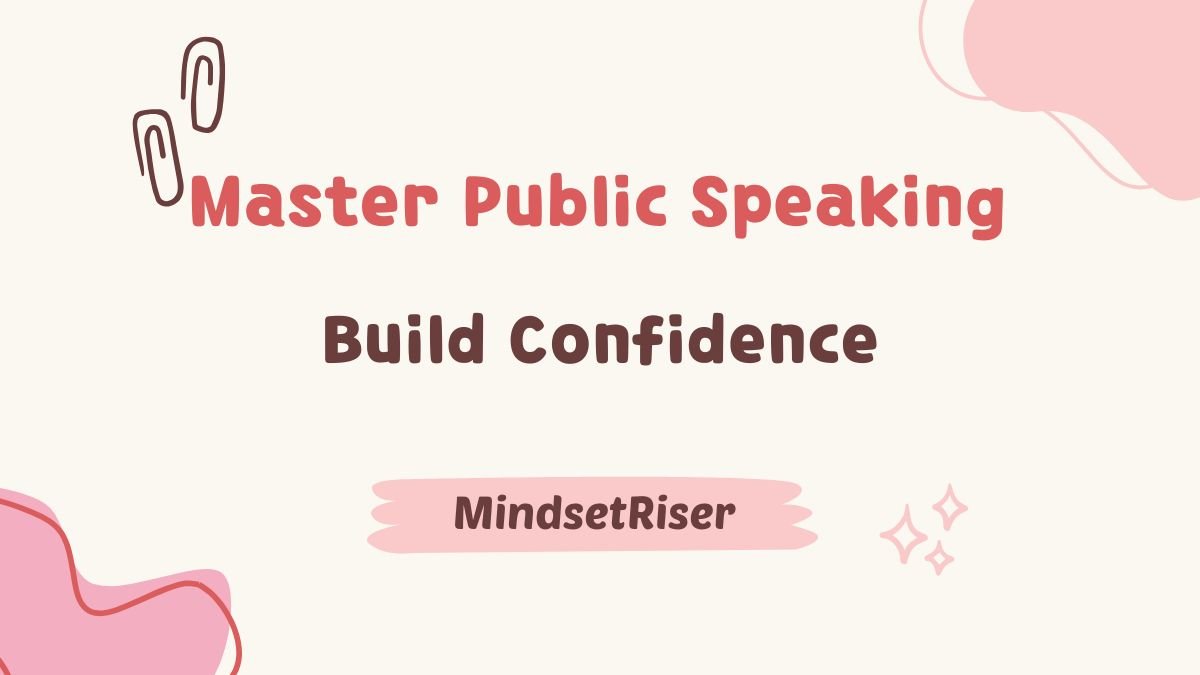Master Public Speaking: Build Confidence and Engage Your Audience
Introduction:
Public speaking—whether you’re presenting in front of colleagues, delivering a keynote, or sharing an idea with a small group—can be both thrilling and terrifying. It’s a skill that holds incredible power: the ability to persuade, inspire, and influence others. Yet, for many, the thought of speaking in front of others sparks anxiety and self-doubt.
But here’s the good news: confidence in public speaking isn’t something you’re born with. It’s something you can develop. With the right mindset, strategies, and preparation, anyone can learn to speak confidently and effectively in front of an audience.
In this guide, we’ll break down proven techniques to help you build confidence in public speaking, tackle nervousness, and deliver impactful presentations that resonate. By the end of this post, you’ll have a clear roadmap to transform your speaking skills—and face your next speaking engagement with confidence and poise.
1. Preparation is Key to Building Confidence in Public Speaking
When it comes to public speaking, preparation is the foundation of building confidence. The more prepared you are, the less you’ll worry about what could go wrong, and the more confident you’ll feel during your presentation. Being well-prepared gives you the confidence to speak effectively and engage your audience.
Here’s how to prepare for public speaking like a pro:
- Know Your Content Thoroughly
One of the most powerful ways to build confidence in public speaking is to master your material. When you have a deep understanding of your topic, you’ll speak more naturally and with greater authority. You won’t have to worry about forgetting facts or stumbling over information. This knowledge will allow you to answer questions with ease, boosting your confidence. - Create a Detailed Outline or Script
While it’s important not to memorize every word, having a clear outline or script is essential. This will keep you on track, ensuring you don’t miss any important points. A well-structured presentation helps you feel more confident, knowing exactly what comes next, reducing the risk of losing your place or going off-topic. - Practice Consistently
Practice is key to feeling confident when you step in front of an audience. Rehearse your speech multiple times, both on your own and in front of others. You’ll get more comfortable with your material, improve your delivery, and learn how to adjust if something doesn’t go as planned. Recording yourself can be an excellent way to review your performance and refine your speech.
2. Manage Anxiety and Nervousness
Feeling nervous before speaking in front of an audience is completely normal. Even the most experienced speakers experience some level of anxiety. The key to building confidence in public speaking lies in managing these nerves effectively. By using proven techniques to calm your nerves, you can step up to the podium with poise and deliver a confident, powerful speech.
Here’s how to manage nervousness and gain confidence in public speaking:
- Practice Deep Breathing
Deep breathing is one of the most effective ways to calm your nerves and regain focus. Before taking the stage, take a few slow, deep breaths to relax your body and mind. This simple technique helps reduce the physical symptoms of anxiety, such as a racing heart or shaky hands, allowing you to feel more composed. - Visualize Success
Visualization is a powerful mental tool. Take a moment before your speech to close your eyes and imagine yourself delivering your presentation with confidence. Picture the audience reacting positively, nodding, and engaging with your message. Visualization helps train your mind to believe in your success, which will, in turn, boost your confidence. - Focus on the Message, Not Yourself
Often, nerves stem from worrying about how you’ll be perceived. Instead of thinking about how you might be judged, focus on the value of the message you’re delivering. When you concentrate on the importance of your content and the impact it will have, it shifts the focus away from yourself and onto your audience’s needs. - Accept Imperfection
Perfection is an unrealistic expectation, especially in public speaking. Mistakes happen—whether it’s a small slip of the tongue or a misstep in your delivery. Embrace the fact that mistakes are a natural part of the process. When you accept that not everything will go perfectly, it becomes easier to handle moments of nervousness and move forward confidently.
3. Master Your Body Language
Your body language speaks volumes, often even louder than your words. In fact, how you present yourself physically can greatly affect how confident and credible you appear to your audience. Mastering positive body language not only boosts your own confidence but also helps you connect more effectively with your listeners.
Here’s how to use body language to project confidence:
- Stand Tall and Maintain Good Posture
One of the easiest ways to exude confidence is by standing tall with your shoulders back and your chest open. Good posture conveys authority and shows that you are confident and in control. Slouching or crossing your arms, on the other hand, can make you appear unsure or defensive, which can undermine your confidence. - Make Eye Contact
Eye contact helps you connect with your audience and shows that you’re engaged and confident. When you look people in the eye, they’re more likely to trust you and feel that you’re confident in your message. However, avoid staring too intensely. A natural, comfortable amount of eye contact will help keep your audience’s attention and show you’re confident in your delivery. - Use Gestures to Emphasize Points
Hand gestures can make your speech more engaging and help reinforce your message. When you use gestures naturally, it shows that you are comfortable with your material. Avoid excessive or distracting gestures, but don’t be afraid to use them to highlight key points or add emphasis to important statements. - Move with Purpose
Moving around during your presentation can help keep your audience engaged and add dynamism to your speech. However, aim to move with purpose. Use the space to emphasize points or connect with different areas of the room. Moving aimlessly can be distracting, so make sure each step has a reason behind it.
4. Engage with Your Audience
One of the most effective ways to build confidence in public speaking is to actively engage with your audience. When you feel a connection with your listeners, the experience becomes more like a conversation rather than a performance. Engaged audiences tend to be more responsive, which can in turn help you feel more confident and in control during your presentation.
Here’s how to engage your audience and boost your speaking confidence:
- Ask Questions
Asking questions is a great way to keep your audience involved and create an interactive atmosphere. You don’t have to ask complex questions; simple prompts can encourage your listeners to think and participate. Whether you’re asking for a show of hands or encouraging brief feedback, this interaction helps you feel more connected to your audience, easing any nervousness. - Use Storytelling
People connect with stories more than they do with facts or data alone. Weave in personal anecdotes or real-life examples to make your speech more relatable and memorable. Storytelling helps humanize your presentation and creates a bond between you and your listeners, which can also make you feel more confident and less anxious. - Read Your Audience’s Reactions
Pay attention to your audience’s body language and facial expressions. If you notice they’re engaged, it can boost your confidence. If they seem distracted, you might adjust your delivery or try a different approach. When you actively read your audience, you gain a sense of control, which enhances your confidence during your presentation. - Maintain a Conversational Tone
Speaking in a natural, conversational tone will make you seem more approachable and relatable. Avoid sounding too robotic or rehearsed. The more you feel like you’re having a conversation with your audience rather than performing for them, the more comfortable and confident you’ll become.
5. Post-Presentation Tips for Building Long-Term Confidence
Once your presentation is over, your journey to building confidence in public speaking doesn’t end. In fact, the post-presentation period is a critical time to reflect, learn, and continue improving. Every speaking opportunity is a chance to build confidence and become a more effective speaker.
Here’s how you can build confidence after your speech and set yourself up for future success:
- Seek Feedback
After your presentation, ask for feedback from trusted colleagues, mentors, or audience members. Constructive criticism helps you identify areas for improvement, but it can also highlight your strengths. Positive feedback reinforces your confidence, reminding you of what you did well. Over time, incorporating feedback will make you a more skilled and confident speaker. - Reflect on Your Performance
Take time to reflect on your presentation. What went well? What could have been improved? By critically evaluating your own performance, you’ll gain insights into areas where you can build more confidence in the future. This self-reflection is key to growing as a speaker. - Celebrate Your Achievements
Don’t forget to celebrate your successes, no matter how big or small. Completing a public speaking engagement is an accomplishment in itself. Acknowledge your progress, and give yourself credit for stepping up and speaking in front of others. This positive reinforcement boosts your confidence and motivates you to keep going. - Keep Practicing
The more you speak in public, the more comfortable you’ll become. Keep practicing and looking for opportunities to present, whether in professional settings, at events, or even in casual conversations. The more experience you gain, the more confident and capable you’ll feel in future speaking engagements.
Conclusion:
Building confidence in public speaking is a journey, but with the right techniques, you can transform your fear into empowerment. From thorough preparation to mastering body language, managing nervousness, and engaging with your audience, each step plays a crucial role in boosting your confidence. The more you practice, seek feedback, and reflect on your experiences, the more capable and self-assured you’ll become.
Remember, public speaking isn’t about being perfect—it’s about connecting with your audience and delivering your message with clarity and confidence. By following the strategies outlined in this post, you can build confidence in public speaking and take your presentation skills to the next level. So, the next time you step up to speak, trust in your preparation, embrace the moment, and know that with each opportunity, your confidence will grow.

